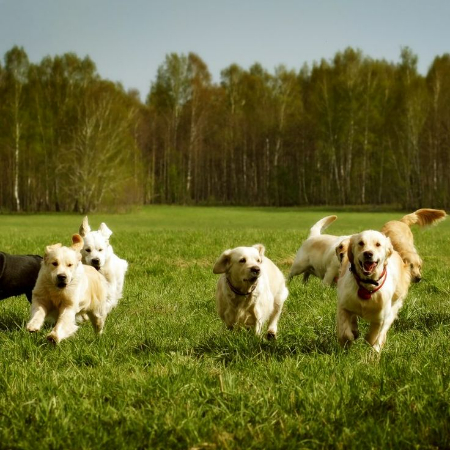The Importance of Canine Socialization: Tips for Raising a Well-Adjusted Dog
Raising a happy and well-adjusted dog requires socialization. Your dog will behave well and be able to adjust to different situations, people, and other animals with the support of proper socialization.
This article explains the benefits of socialization and offers advice on how to raise a self-assured and well-mannered dog.
Why Socialization Matters
Reduces Fear and Anxiety
Your dog’s emotional health and behavior depend on how effectively they are socialized. Unsocialized dogs can experience stress from everyday events because they grow afraid or nervous in strange situations.

You can teach your dog that unfamiliar situations and people are not dangerous by exposing them to a range of experiences from an early age. A more self-assured and well-mannered pet can result from this early exposure, dramatically reducing fear and anxiety.
Dogs who feel at ease in various settings are less likely to display undesirable traits like aggression, excessive barking, or destructiveness, therefore socialization also encourages improved behavior. A well-socialized dog makes a better friend overall since they are happier and more adaptive.
Promotes Good Behavior
Socialized dogs are typically more well-mannered and show better behavior. This is because they can respond calmly and confidently to a variety of stimuli and are used to handling them.
Since they know how to behave properly with people, other animals, and their surroundings, they are less likely to display undesirable traits like hostility, excessive barking, or destructive inclinations. Appropriate socialization lessens the possibility of unwanted behaviors by teaching dogs how to react to novel situations without fear or anxiety.
As a result, socialized dogs make for more pleasurable companions. They are also easier to handle and more accepted in a range of social contexts, such as parks and friends and family’s homes.
Enhances Adaptability
A dog that has received proper socialization may find it easier to adjust to changes in their surroundings, such as moving to a new house or meeting new people and animals. They were exposed to a range of situations from a young age, which helped them learn that change is a natural part of life and nothing to be afraid of, which accounts for their flexibility.

Because of this, people are less prone to experience tension or anxiety in unfamiliar circumstances. For the dog and its owner, this results in less stressful and more seamless transitions.
The ability of a well-socialized dog to adjust to new circumstances often improves their well-being and guarantees that they maintain their composure and confidence in a variety of settings.
Strengthens Human-Animal Bond
Your relationship with your dog can be greatly enhanced by socializing with them. You can encourage your dog to develop greater affection and trust by exposing them to positive encounters with people and other animals.
These satisfying encounters give your dog the impression that the outside world is fun and safe, which helps them feel more at ease and self-assured. Your dog will come to depend on you for direction and comfort as they learn how to behave in different social settings, strengthening your bond of trust.
As a result of this close attachment, your dog will be more affectionate towards you and other people, more receptive to instruction, and more pleasurable to be around.
Tips for Socializing Your Dog
Early and Varied Socialization
The critical socialization stage, which lasts from 3 to 14 weeks of age, is the ideal time to begin socializing your dog. That said, it’s never too late to start socializing an elderly dog.

Puppies benefit from early socialization in terms of confidence and flexibility, but older dogs can also gain from being exposed to novel situations. Expose your dog to different places, such as parks, pet stores, and outdoor cafes, to guarantee that they grow up to be well-mannered.
Your dog will be more adept at adjusting to new circumstances in more varied habitats. Frequent travel teaches them how to handle a variety of situations with poise and confidence, which lowers anxiety and encourages positive behavior.
Positive Socialization Techniques
Your dog’s social development needs to expose them to a variety of people and animals. To make sure they get used to interacting with a variety of people, let your dog socialize with individuals of different ages, genders, and looks.
To boost their self-esteem and social abilities, make sure they interact well with other canines and animals. During this procedure, it is crucial to use positive reinforcement. Give your dog attention, praise, and incentives when they behave calmly and well during socialization.
This method makes socialization pleasant and pleasurable by assisting kids in associating new experiences with favorable results, which reinforces good behavior. Positive reinforcement coupled with exposure to a variety of social settings will help your dog develop into a confident and well-adjusted friend.
Effective Socialization Strategies
An organized strategy for socializing your dog is to enroll it in puppy training lessons. Puppy socialization under expert supervision while learning fundamental instructions is facilitated by these classes, which offer a safe and supervised setting.

Their social skills and confidence are developed in a monitored environment through this engagement. Furthermore, it is important to gently introduce new experiences to your dog. Starting from less demanding settings, such as peaceful parks or well-known neighborhoods, you can progressively introduce them to busier areas or novel kinds of interactions as they gain comfort.
Because of the stepwise approach, your dog will learn to adjust without feeling overwhelmed and will form pleasant associations with new situations. Puppies can be socialized and a solid foundation can be established by combining puppy lessons with gradual exposure to a variety of settings.
Understanding and Supporting Your Dog
When socializing your dog, it’s important to watch his body language. Observe closely for symptoms of discomfort or stress, such as snarling, cowering, or heavy breathing. You should take your dog out of the area and try again later, taking more time to go slowly, if you see these indications.
Dogs can detect your emotions, so keeping your composure will also make them feel safe and comforted. Staying calm and confident is also essential.
Your dog will benefit from pleasant and successful socialization experiences that build their confidence and overall well-being if you pay close attention to their cues and maintain a composed, encouraging presence.
Doglime for more dog-related information.
Tags










